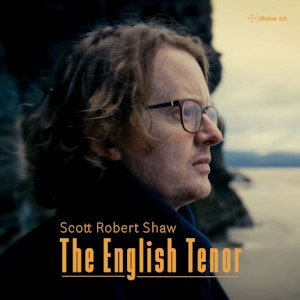
The English Tenor
Ivor Gurney (1890-1937)
Five Elizabethan Songs
Ralph Vaughan Williams (1872-1958)
Along The Field
Roger Quilter (1877-1953)
Four Songs Op.14
Benjamin Britten (1913-1976)
Eight Folksong Arrangements for High Voice and Harp
Gerald Finzi (1901-1956)
Let Us Garlands Bring Op.18
Scott Robert Shaw (tenor)
rec. 2021-23
Divine Art DDX21110 [72]
The English Tenor in this recital was born in Australia and now lives in Germany. In his own booklet note, he emphasises that his musical education took place in England. After “a tilt at the windmill of opera” and a “deep dive into German Early Music”, he decided to almost start again at addressing “several decades of bad vocal habits”. He did it during Covid lockdowns with the help and uncompromising guidance of his friend and singing teacher Brett Goulding. Naturally enough, this involved taking a deep look at the repertoire most suitable for his voice. One day, his teacher told him that he was an “English Tenor”, classified as such by his voice type. Hence the title of the recital.
The singer goes on to refer to several well-known names who have or had the same sort of voice: Peter Pears, Anthony Rolfe Johnson and Ian Partridge. I would add Ian Bostridge and John Mark Ainsley to the roll-call. This very distinguished list contains two names that I particularly respect: Partridge and Bostridge. The discs that feature these artists have given me hours of considerable pleasure. To be sure, such an explicit reference invites comparisons, and those may not always be to Scott Robert Shaw’s advantage.
Firstly, his voice. The instant I heard him, several days before I read the booklet, I knew of suitable comparisons: singers I just mentioned. His light, reasonably powerful voice has a slight, rapid vibrato. It is not excessive and does not interfere with my appreciation of the singing. His voice is pure and does not spread under pressure.
Secondly, I was particularly keen to listen because the programme includes Vaughan Williams’s eight-song cycle of Houseman settings Along The Field. This rarely recorded work is more-or-less contemporaneous with Flos Campi, the Concerto Accademico, the Piano Concerto and the 4th Symphony. The composer was establishing a facet to his style which was more austere and often, in its dissonance, more demanding of the listener. So it proves with this cycle. The solo violin accompaniment is unusual. The composer treats it very sparely, and often allows the voice to proceed without the violin.
The cycle does not have the melodic effect of On Wenlock Edge, and the harmonies sound rather oblique. The tunes, however, most obviously given to the voice, are there for those willing to listen. Yet, the settings are austere, thus (I suppose) their relative unpopularity. Even so, I think it is unjustified, because the composer works miracles with limited resources. At least two of the songs are set in the wintry countryside. Even when winter does not add to the austerity, the melodic cast supported by the mourning violin expressively illustrate the general themes of life’s transience and love lost, so typical of Houseman’s poetry. I have just one other version, a 24-year-old recording on Hyperion CDA67168 in which John Mark Ainsley is accompanied by an unnamed soloist from The Nash Ensemble. For me, Ainsley achieves a far greater interpretive insight than Scott Robert Shaw. He employs a more careful gradation of tone, volume and expressive inflexion: a less uniform presentation, if you will.
Of the other groups of songs here, those by Gurney and Finzi may be the best known. I enjoyed Shaw’s performances very much. Only Sleep from Gurney’s Five Elizabethan Songs disappointed, but then I was comparing it with Janet Baker’s early 1963 recording. A similar comment applies to Finzi’s Come Away, Come Away Death and It Was a Lover and His Lass.
I much enjoyed the performance of Britten’s Eight Folksong Arrangements for High Voice and Harp, which I had not heard before. Thanks to the booklet note I am now aware that he arranged over a hundred traditional songs from many European countries. His other, greater works are far more in the public mind than these slight songs. They vary from the exuberant, such as The Bird Scarer’s Song, to the amusing Lord! I Married me a wife and the introspective David of the White Rock. The harp accompaniment adds a welcome variety to the programme.
The booklet contains an introductory biography. It explains why Divine Art needed varied recording sessions under the lockdown rules declared by the German and Dutch governments, not to mention the singer’s Covid infection which disrupted the recording of Along the Field. Full song texts and descriptions are included. The biography also appears in German, as do the descriptions of the song cycles. The recordings are admirably clear, and the overall production standards are excellent.
Jim Westhead
To gain a 10% discount, use the link below & the code musicweb10

Other performers and recording data
Scott Robert Shaw (tenor)
Gurney: Luba Podgayskaya (piano)
Vaughan Williams: Eva de Vries (violin)
Quilter: William Drakett (piano)
Britten: Emilie Bastens (harp)
Finzi: James Williams (piano)
rec. The Netherlands, 2021 (Gurney), UK, 2022 and 2023 (Vaughan Williams), Germany, 2021 (Quilter), UK, 2021 (Britten), UK, 2021 and 2023 (Finzi)
Full song texts in English
Notes in English and German


















